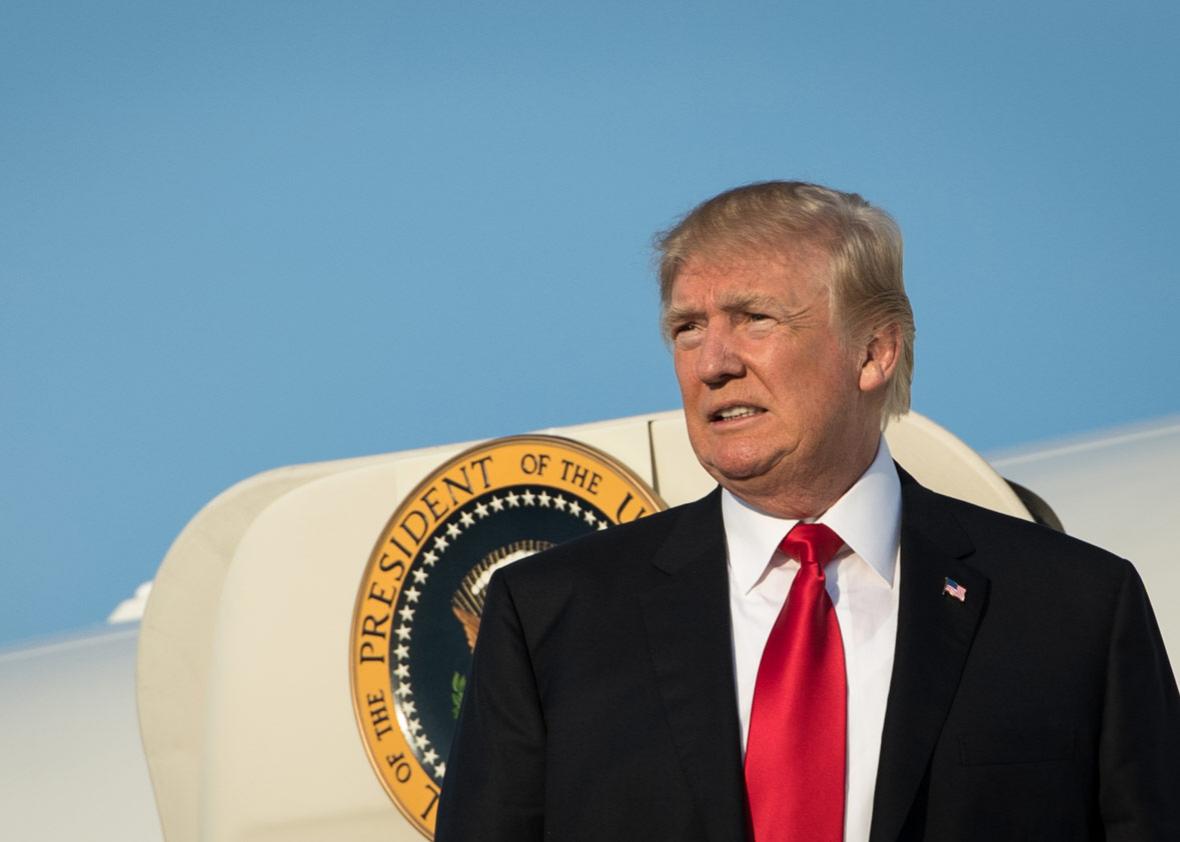We are just six months into Donald Trump’s term as president. But the rapid pace of news—and the extent to which those events are quickly metabolized by the public—has made it feel like an eternity. Each week brings new revelations of misconduct and transgressive behavior, from Trump’s breathless attacks on the press to his open contempt for the independence of federal law enforcement. And if it’s not Trump’s individual behavior that drives headlines, it’s the actions of his administration and its allies in Congress, from the “Muslim ban” to the full-on effort to gut Medicaid and unravel what’s left of the federal social safety net. The sheer volume of controversy feels unsustainable, and it’s hard not to be gripped by the sense that this is the nadir of Trump administration; that it can’t get worse.
But it can. It likely will.
Consider the last Republican presidency. Between the Iraq war, torture, and the disastrous response to Hurricane Katrina, George W. Bush’s critics remember him as one of the worst presidents of America’s post–World War II era, a woefully ill-prepared and ill-informed figure who left the nation and the world worse than how he found it. Memory being what it is, it’s easy to remember Bush as being terrible from the beginning, that the dark course of his administration was evident from the moment he entered office.
This isn’t true. For most of his first year, until the attacks on Sept. 11, Bush was an unremarkable, even mediocre, president. His was a typical Republican administration, with an interest in tax cuts, deregulation, and conservative social policy, with occasional bipartisan cooperation from a Senate Democratic majority. The milestones of Bush’s administration—the events and choices that form the bulk of his legacy—wouldn’t happen for at least two years after his inauguration. From the perspective of July 2001, it was far from obvious that Americans were facing an era of profound political turbulence, and even less obvious that this would be the function of an empowered executive branch, flexing its muscle at every opportunity.
Now, of course, it is obvious that we are living in interesting times. Indeed, it’s the only conclusion to draw when the president is a former reality television star who rode to office on a wave of racial resentment and reactionary populism. For as disruptive and violative as the mere fact of a Trump presidency seems, however, we should remember that it’s still early, and we have yet to witness the full scope of this administration’s capacity to cause or exacerbate disaster. This is a sweet summer of the Trump era—not the winter it feels like. Still to come is the acute crisis (as opposed to slow-moving ones like climate change or the crumbling of American infrastructure) that will define the Trump presidency. And whether it’s war or economic collapse, a crisis of constitutional legitimacy or of crippling mismanagement, it is coming, an inevitable stop on this distressing national journey.
That fear, perhaps, is why impeachment—or the “25th Amendment option”—has captured the imaginations of Trump opponents across the country. It’s not just his endless entanglements, conflicts of interest, and clear attempts to enrich himself with taxpayer dollars—it’s the sense that with him at the helm, we are teetering toward a ruin we won’t recover from. “I know that there are those who are talking about, ‘Well, we’re going to get ready for the next election,’ ” said California Rep. Maxine Waters, a vocal advocate for removing the president, at a recent talk on the subject. “No, we can’t wait that long. We don’t need to wait that long. He will have destroyed this country by then. We cannot wake up every morning to another crisis, to another scandal. We cannot have the uncertainty.” Over this past weekend, protesters in dozens of cities held rallies where they called for Trump’s impeachment.
Last week, acting on the same urgency, a group of House Democrats gathered behind a bill that could create a path to removing Donald Trump from office using the 25th Amendment. The legislation, introduced by Maryland Rep. Jamie Raskin, would create a congressional oversight commission that could declare the president incapacitated and unable to perform his duties. It would then recommend that the president be removed from office and replaced by his vice president, Mike Pence.
But while both these options reflect the state of fear much of the country finds itself in, they also capture a kind of Hail-Mary helplessness. Impeachment and the 25th Amendment option are dead ends. The former requires a Congress willing and able to act against the president, and with a Republican-controlled House and Senate, that is unlikely, even with a cause for action. And the latter depends on the president’s Cabinet, which has to invoke the 25th. Even then, a two-thirds vote of Congress is needed to actually remove Trump from office. The odds of either happening, even with Democratic majorities—with every Democrat voting in favor—are incredibly slim, if nonexistent, as barring an unprecedented Democratic victory in 2018, the party will still need Republican votes.
At this stage, our most likely future is one where Donald Trump serves at least four full years in office. He will have to meet whatever crisis comes our way, and he will shape our response and recovery, even if he lacks the capacity to do so in a way that won’t further damage American life and society. And there’s no obvious mechanism that will end his tenure prematurely—no check or balance as envisioned by the founders that will neuter his power as president. For the foreseeable future, barring extraordinary events, Trump will sit in the Oval Office. And while it may feel like we’ve seen the worst of what that means, the truth is that the worst, like the future, is a country yet to be discovered.
